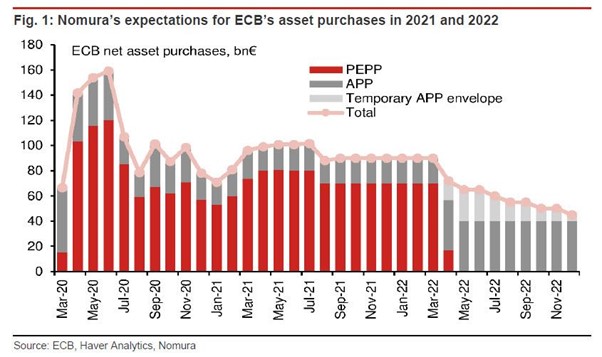Slightly Hawkish ECB Stance Sets the Stage for Euro Advance

It’s not policy tightening, but the first serious hint that the process of withdrawal from extraordinary easing measures has begun. The ECB announced today at its meeting that it will reduce the rate of asset purchases in the framework of PEPP, thus putting less downward pressure on market interest rates.
It is clear that the ECB has begun to move towards normalization of policy and today's meeting lays the groundwork for expectations that at upcoming meetings the ECB will likely start talking about PEPP tapering. Nomura predicts expansion of the ECB balance sheet as follows:

That is, by the second quarter of 2022, the purchase of assets under the PEPP may completely stop. In this case, a number of important statements from the ECB may await us in the not-so-distant future. An important signal for this was the very fact of the transition to reduction in purchases.
We have already talked about the fact that some of the ECB officials began to speak openly about the risks of stimulating the economy for too long. The central bankers of Denmark and the Netherlands have said in separate interviews that the PEPP should be completed in March next year, indicating that the debate over the future course of the ECB will get hotter and hotter in the near future.
Other important points from the ECB statement:
- The rate on deposits remained at the level of -0.5%, the main refinancing rate at the level of 0.
- Inflation may be moderately above the target for a while. This means that higher inflation, especially in the first months, will not necessarily mean a response from the ECB in the form of a tightening of policy, and the reaction of markets to the data may not be as strong as it seems.
- Monthly purchases of the standard asset purchase program will continue at € 20 billion. They will last as long as necessary, and upon completion of the QE, the ECB will start raising interest rates.
Disclaimer: The material provided is for information purposes only and should not be considered as investment advice. The views, information, or opinions expressed in the text belong solely to the author, and not to the author’s employer, organization, committee or other group or individual or company.
Past performance is not indicative of future results.
High Risk Warning: CFDs are complex instruments and come with a high risk of losing money rapidly due to leverage. 73% and 72% of retail investor accounts lose money when trading CFDs with Tickmill UK Ltd and Tickmill Europe Ltd respectively. You should consider whether you understand how CFDs work and whether you can afford to take the high risk of losing your money.
Futures and Options: Trading futures and options on margin carries a high degree of risk and may result in losses exceeding your initial investment. These products are not suitable for all investors. Ensure you fully understand the risks and take appropriate care to manage your risk.